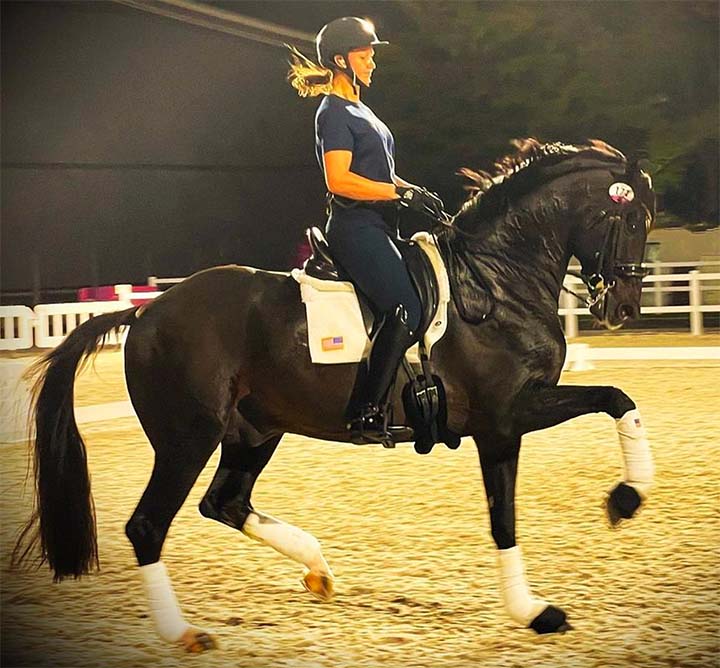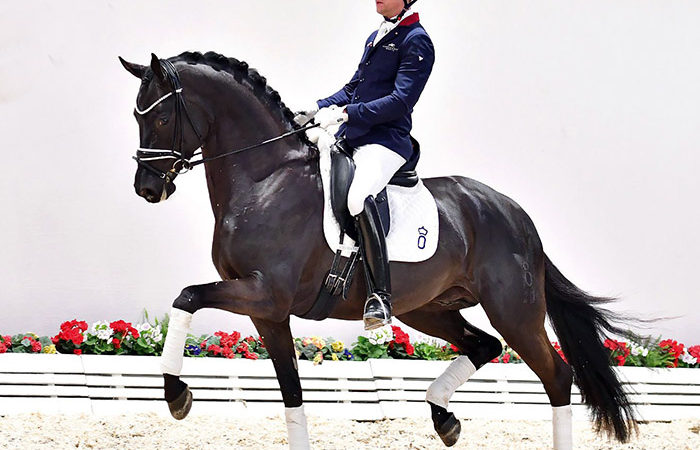USA Dressage Team Riders, Horses Accustomed to Florida-Type Weather Ready for Tokyo Olympic Grand Prix Without Spectators in Two Days
5 years ago StraightArrow Comments Off on USA Dressage Team Riders, Horses Accustomed to Florida-Type Weather Ready for Tokyo Olympic Grand Prix Without Spectators in Two Days

July 22, 2021
United States Olympic dressage team riders Adrienne Lyle, Steffen Peters and Sabine Schut-Kery said Thursday their horses that were accustomed to the Florida-type subtropical weather were fit and ready for the Grand Prix beginning in two days in Tokyo in the stadium they described as “stunning.” But it will be empty because of the ban on spectators though they said the lack of fans will make no difference to the focus on their performances.
Adrienne Lyle, 36, of Wellington, Florida with Salvino, Steffen Peters, 56, of San Diego, California with Suppenkasper and Sabine Schut-Kery, 52, of Napa, California with Sanceo had high praise for the organization and friendliness of their Japanese hosts while following strictly enforced requirements to deal with Covid-19 that led to these Games being delayed for a year.
The riders–Adrienne on Salvino and Steffen on Suppenkasper were on the 2018 World Equestrian Games silver medal team–said they follow the rules from their early morning starts, with a break back at their hotel before returning at night when the four days of competition will be staged under lights over the next week as a counter to the hot and humid weather.
“The venue is impeccable, the footing is amazing, the ring is absolutely beautiful,” said Adrienne who with 14-year-old Hanoverian stallion Salvino is one of only five combinations among the 60 from 30 nations to have scored at least 80% in the Grand Prix. The others are the three German team pairs, Isabell Werth on Bella Rose, Dorothee Schneider on Showtime and Jessica von Bredow-Werndl on Dalera as well as Cathrine Dufour of Denmark on Bohemian.
Attention has been paid throughout the facility, she said, with climate-controlled stabling for the horses. The U.S. team is stabled in the same section with Germany.
Debbie McDonald, the team coach, described as “amazing” the planning and preparation by the U.S. federation for the team. “Without them,” she said, “I don’t think we would have had this kind of experience, because I see other countries really struggling.”
“There are definitely a lot of precautions in place,” said Adrienne who rode for the United States at the 2012 Olympics. “You don’t get more than 50 feet (15 meters) without sanitizing your feet and your hands. Everyone is wearing masks very strictly. Temperature checks coming into the venue and into the hotel. As a team we’re taking extra precautions; we’re not out socializing at all.
“Everyone has worked so hard to get here so we’re being extra, extra careful so we don’t do anything to jeopardize our team.”
Under the format for these Games, teams are limited to three riders and horses so there is no drop score. If a rider or horse is not able to start because of Covid or some other reason, for example, nations with reserves can call in the backup otherwise there is no longer a team.
The horse inspection is scheduled for Friday followed by two days of Grand Prix in which all 60 combinations–45 from 15 teams plus 15 individuals–will compete. The top eight teams move on to the Grand Prix Special on July 27 with a clean slate to decide team medals. The top 18 combinations from the Grand Prix earn a start in the Grand Prix Freestyle for individual medals.
Sabine said the Americans were lucky to be able to acclimate at the Olympic observation event in hot and humid Wellington, Florida with weather similar to that in Tokyo, then remain there until leaving for quarantine in Europe ahead of flying to Tokyo.
Adrienne said the riders were learning how to bow, emulating the courtesy that is normal in Japan.
“The kindness and friendliness is contagious,” said Steffen who is at his fifth Olympics in the past quarter century.
“We notice ourselves, when we greet each other in the morning, we bow not just once but twice. It’s really not that hard to be nice and I really think we can learn a lot from the Japanese culture.”

